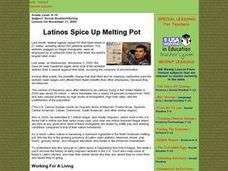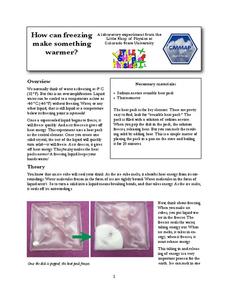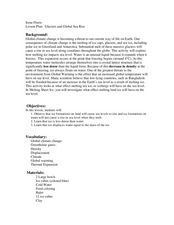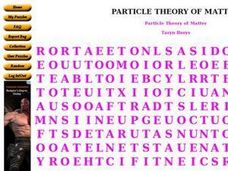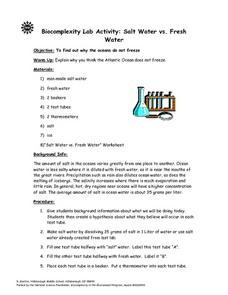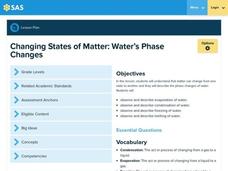Curated OER
Pressure Melting of Ice: While-U-Wait
Learners demonstrates one of the few cases in which geologic solids visibly deform at room conditions. They suspend a weight on a thin wire over an ice cube to observe its effects over time.
Curated OER
Latinos Spice Up Melting Pot
Students investigate the history of early Hispanic workers in the U.S. They complete an online Webquest, explore various websites, read about Latinos in the U.S. today, view a mural, and answer discussion questions.
Curated OER
Melt the Ice
Students examine and discuss how water changes from a liquid to a solid to a gas. They explore this concept by having an ice cube race, competing to see which group can change the solid water back into liquid water first.
Colorado State University
How Can Freezing Make Something Warmer?
Crazy fact—freezing liquid actually gives off heat! Young scholars investigate the transfer of energy when liquids freeze using a chemical heat pack. The heat pack gives off heat as its liquid core freezes.
Virginia Department of Education
Heat and Thermal Energy Transfer
How does radiation affect our daily lives? Answer that question and others with a lesson that discusses radiation and its use in thermal energy transfer through electromagnetic waves. Pupils investigate vaporization and...
Merck KGaA (Darmstadt, Germany)
EMD PTE
You can't tell by the title, but this is a functional periodic table of elements. Incorporating bright colors, lucid text, and easily operated features, this application serves as a valuable reference tool for your chemistry class.
Curated OER
Glaciers and Global Sea Rise
Students explain how melting glaciers affect global warming. In this earth science lesson, students investigate the change in ice density as it melts. They discuss the human and environmental impact of rising sea levels.
Curated OER
Refrigeration Part 2 - How they work
Fourth graders investigate insulators and how refrigerators actually work to keep things cold through evaporation and pressure changes in the coolant. They create a box to keep an ice cube from melting, and observe a variety of...
Curated OER
Rising Sea Levels: UK and Bangladesh
Students explore the possible effects of global warming. In this geography/global warming lesson, students identify regions using an atlas and complete a global warming worksheet. Students perform an experiment in which they simulate...
Curated OER
States of Matter
In this states of matter worksheet, students fill in the blanks using the terms evaporation or condensation for 4 statements. They match vaporization, condensation, evaporation and boiling to their definitions. They fill in 8 blanks with...
Curated OER
Cartoons for the Classroom: Al Gore Heats up a Debate
In this current events learning exercise, students analyze political cartoons about Al Gore's "An Inconvenient Truth." Students respond to 3 talking point questions.
Curated OER
State Change
Eighth graders explore the physical change of matter. As a class, they discuss their favorite super hero and determine if the hero undergoes a physical or chemical change. Students examine the change of state and phase change. In groups,...
Curated OER
Geography: examining the Glacial Features of Cape Cod
Young scholars examine satellite images of the glacial features of Cape Cod. They analyze where human activity is located in terms of those features. Students make models of the features, including kettle holes. They also use contour...
Curated OER
Wax Museum
Student role play as statues in a wax museum while the teacher takes the role of the curator. They stand in a static position until the curator leaves the room. They interact until the curator returns at which point they freeze. Now they...
Curated OER
Intermolecular Forces
In this compounds activity, students identify the main intermolecular force in the given compounds and explain the differences between dipole-dipole forces and hydrogen bonds. This activity has 5 short answer questions.
Curated OER
Particle Theory of Matter
In this science word search worksheet, students identify and locate words in a puzzle that relate to particle theory of matter. There are 24 words to locate in the puzzle and spell correctly.
Curated OER
Salt Water vs. Fresh Water
Students explore why the oceans do not freeze. They explain why they think the Atlantic Ocean does not freeze. Students are given background information about what they are doing. They create a hypothesis about what they believe...
Pennsylvania Department of Education
Changing States of Matter: Water’s Phase Changes
Third graders observe the properties of water and in its different states. In this states of matter lesson plan, 3rd graders view a video, read The Magic School Bus at the Waterworks and experiment with freezing, melting and...
Curated OER
Melt in Your Mouth Subtraction
Students engage in a instructional activity which involves role-play and the use of manipulatives to solve subtraction problems. After a lecture/demo, students utilize a worksheet imbedded in this plan to gain subtraction practice. They...
Curated OER
Snowflake Crystals
Fourth graders explore physical changes and the true life story of Wilson Bentley. They observe the changes that take place with snowflakes. Students discuss what happens when snow flakes melt. They create their own snowflakes using...
Curated OER
Weather Maps and Prediction
Second graders point out symbols for high and low pressure that would be found on weather maps. They break into small groups and use a copy of the weather maps file to make observations about the maps and come up with an explanation of...
Curated OER
State of Matter - Atoms
Learners examine and discuss how atoms change from solid to liquid to gas. They inflate a balloon by melting ice that converts to steam, and discuss the results.
Curated OER
Icebergs Ahead!
Young scholars examine icebergs and how they are suspended in water, why ice floats, the melting process of an iceberg, and the floating behavior of ice compared to that of a cork through a lab activity.
Virginia Department of Education
States of Matter
Scientists have been studying exothermic reactions before they were cool. The lesson begins with a discussion and a demonstration of heat curves. Scholars then determine the heat of fusion of ice and the heat needed to...



